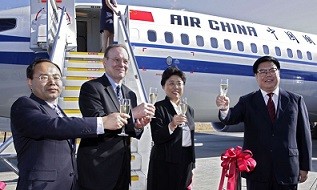Global aircraft manufacturer Boeing predicted an upward trend in its market forecast for business aircraft deliveries in China over the next 20 years, despite the instability seen in China's equity markets, the Century Business Herald reported.
In its market outlook report, Boeing said that over the next 20 years, the country will need 6,330 aircraft, a 5-percent increase from last year's two-decade estimate, with the aircraft demand valued at $950 billion.
According to Boeing, the aircraft demand is equivalent to 16.6 percent of the world total and 42 percent of the total in the Asia-Pacific region during the period, and the estimated $950-billion value in demand will account for 17 percent of the world total.
The report said that China's fleet of commercial aircraft will nearly triple over the next two decades, from 2,570 planes in 2014 to 7,210 planes in 2034.
Randy Tinseth, vice president of the marketing division of Boeing Commercial Airplanes, said that by 2030, China is expected to exceed the U.S. as the world's largest market for commercial aircraft.
Last year, Boeing had predicted aircraft demand in China to reach 6,020 new airplanes, valued at $870 billion over the next 20 years. In its latest projections, the company said that the forecast demand in China through 2034 will reach 4,630 for single-aisle airplanes, valued at an estimated $490 billion.
The company added that new carriers and low-cost airlines in developing and emerging markets, including the continued expansion at established airlines. have driven the growth in this sector.
China's low-cost carriers account for about 8 percent of single-aisle market demand, which is expected to increase to 25-30 percent by 2034.
For the wide-body segment led by small and medium-wide-body airplanes such as the 777-300ER (Extended Range), 777X and the 787 Dreamliner, Boeing expects that it will require at least 1,500 new airplanes.
About 14,330 new aircraft are expected to enter service in Asia, representing the bulk of new deliveries over the coming 20 years, Boeing noted.






















